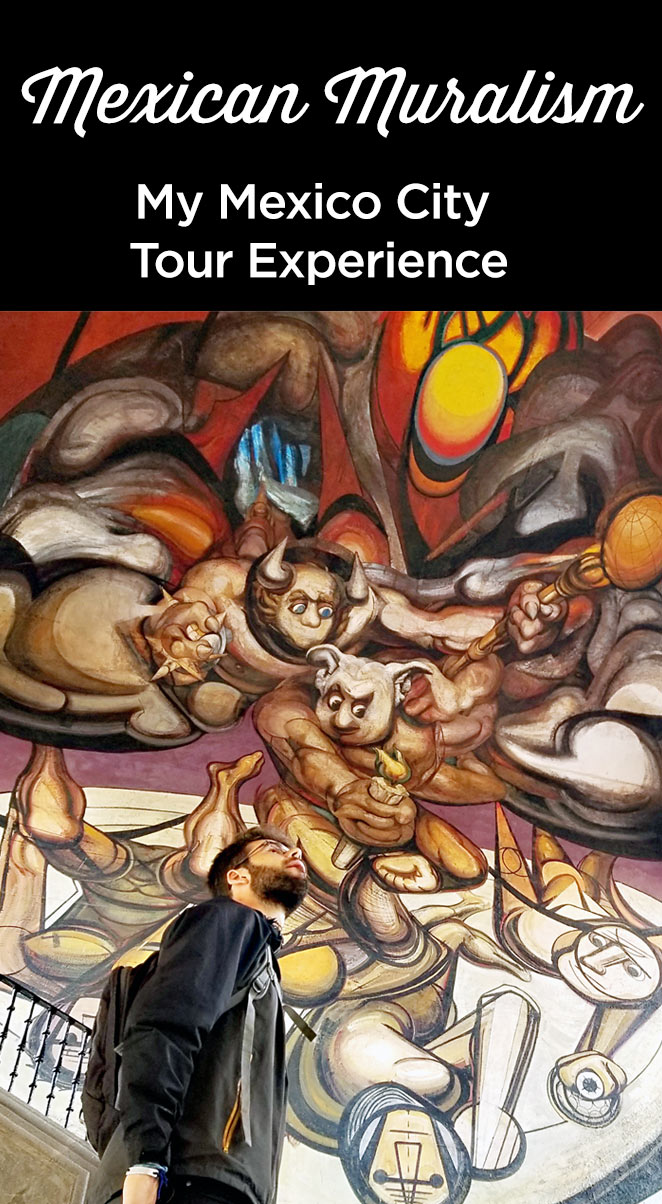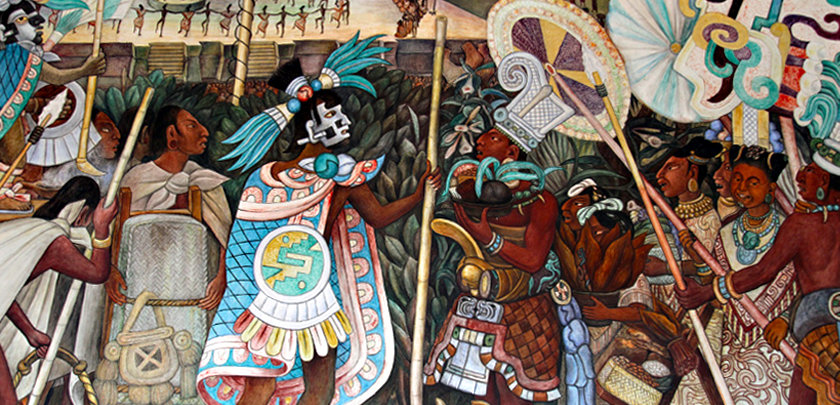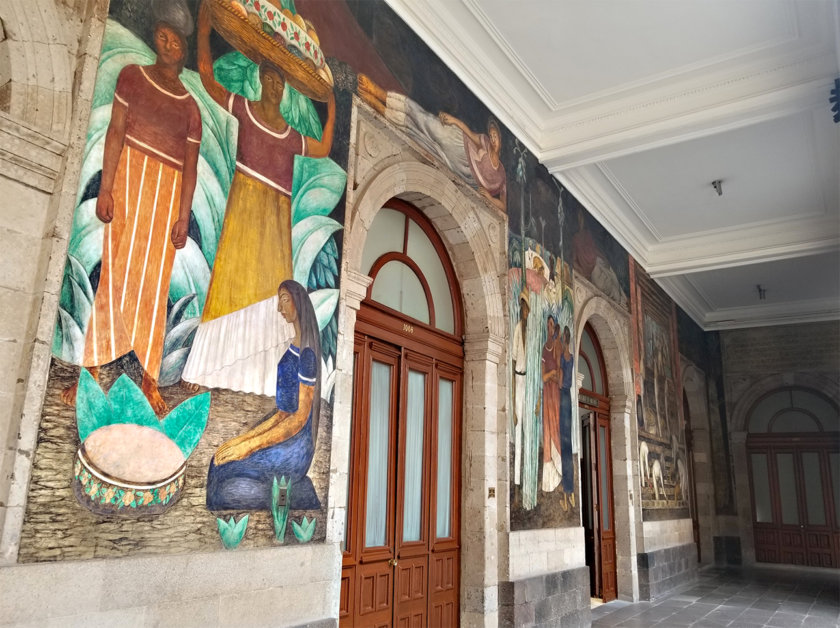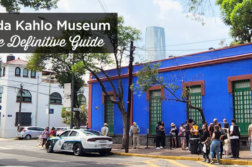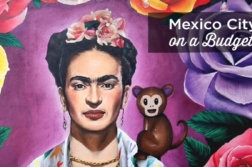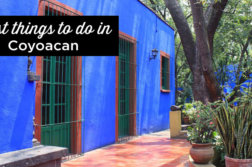Muralism in Mexico City: A Bucket List for Art Lovers
When I first arrived in Mexico City a few years ago, I was completely unfamiliar with Mexican muralism.
So when Estacion Mexico offered me a guided tour of Mexican muralism in the center of the capital, I had to look at good old Wikipedia:
“Mexican muralism, an art movement initiated by the government after the Mexican Revolution (1910-1920), aimed to depict Mexico’s past, present, and future through large, educational wall murals in public spaces.
These murals, rich in social, political, and historical themes, were led by “The Big Three” artists: Diego Rivera, José Clemente Orozco, and David Alfaro Siqueiros, starting in the 1920s. “
Ah, of course, Diego Rivera, Frida Kahlo‘s husband. It’s all right, I know a little about him.
Meet up in front of the magnificent cathedral. It’s impossible to miss the pink T-shirt of Diana, today’s guide.
Sommaire
1st stop: the Secretaria de Educacion Publica
This is the institution in charge of Education in Mexico, where programs and projects are developed for all levels of education, private and public.
It was created in the early 20s, in an attempt to solve the major educational problems facing the country. Indeed, the Mexican revolution (1910-1920), which had taken place to combat social inequality, may have been over, but in a territory where 60 dialects were spoken, 90% of the population was still illiterate.
It was under the leadership of José Vasconcelos (1922 to 1929), commissioned by President Alvaro Obregon, that a vast project of cultural dissemination was launched throughout Mexico, with particular emphasis on rural areas. A major educational and cultural exchange program with other countries on the continent was also launched.
Vasconcelos also supported numerous artists and intellectuals, and eventually succeeded in convincing major artists such as Siqueiros, Orozco and Rivera to settle in the capital and open up new avenues of artistic thought and expression.
If this seems rather trivial today, it was quite unusual at the time to offer them such visibility. After years of dictatorship, it underlined the importance of changing their living conditions.
Diego Rivera was also fascinated by traditions. We therefore discover several works that present them, such as dances, the celebration of the Day of the Dead (Dia de Muertos), Holy Week and the corn harvest.
We also learn more about the importance of women during the Mexican Revolution.
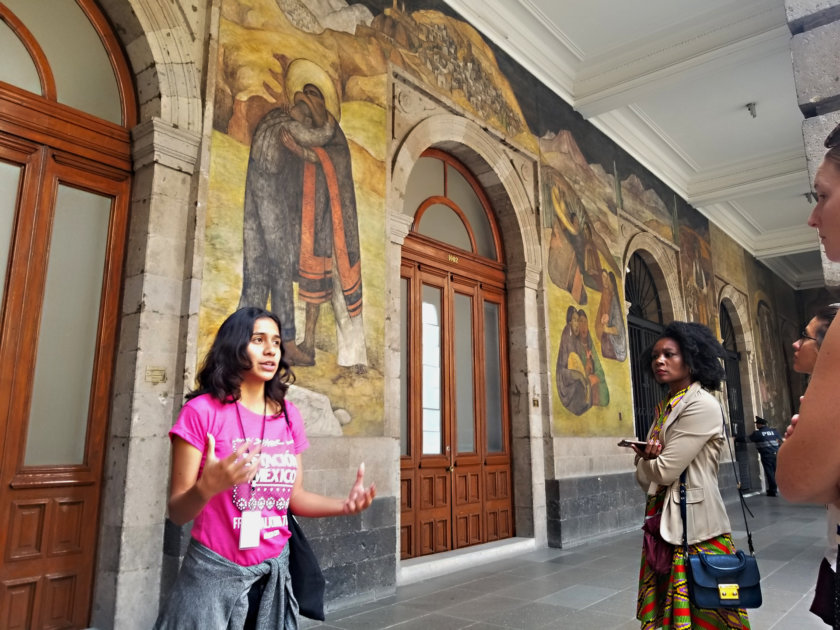
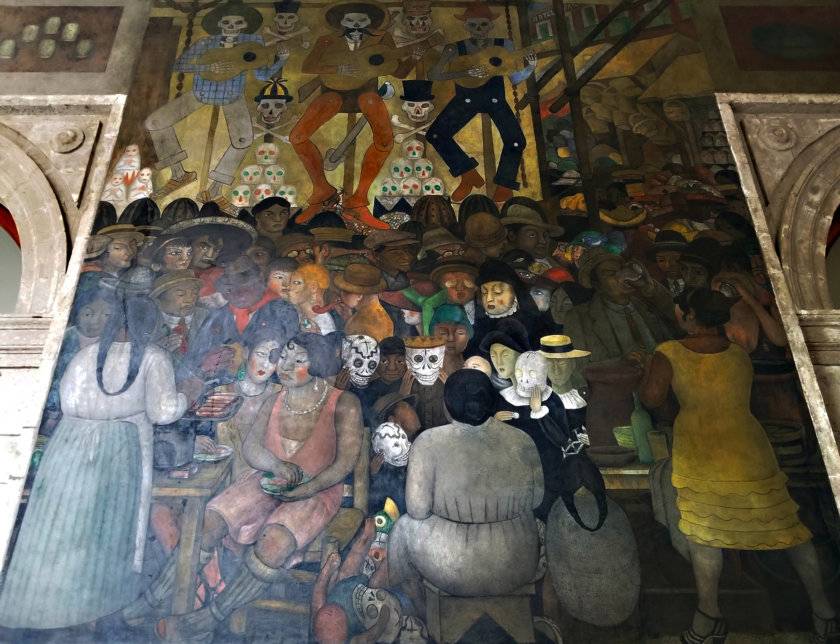
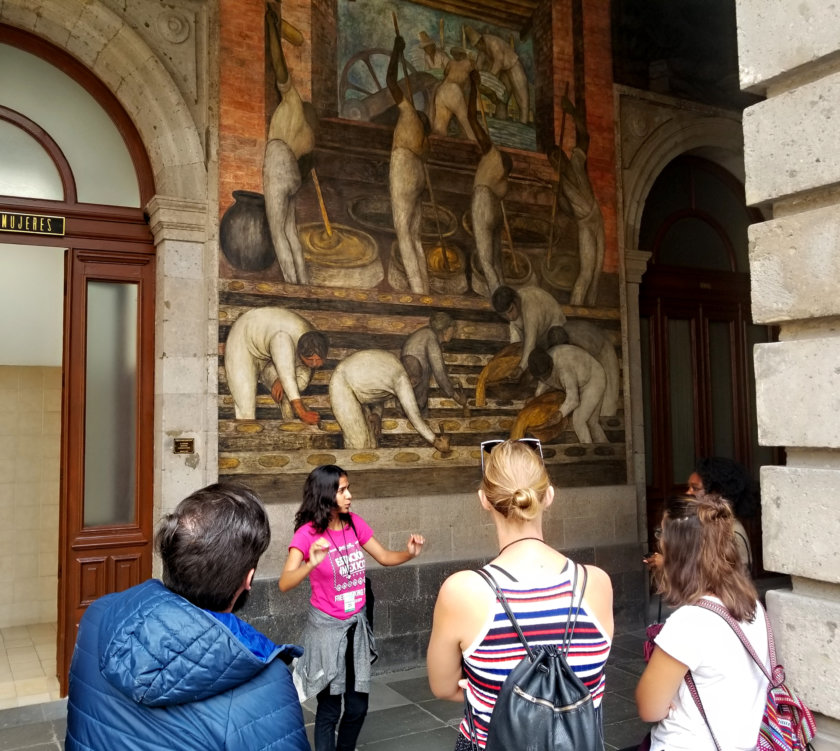
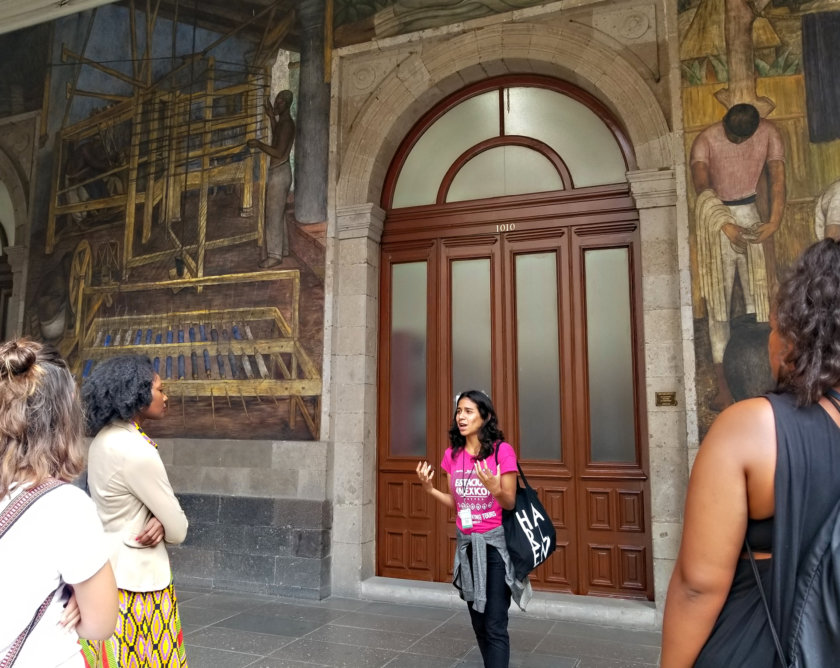
Diana then takes us to discover the 2nd great muralist: we arrive in front of a huge fresco (never finished for lack of funding) by David Siqueiros, “ Patricios y Patricidas “.
While Diego Rivera’s frescoes were composed of several layers of paint, Siqueiros used more modern techniques and materials.
The result is completely different, but the plastic paint is cracking, making it difficult to restore.
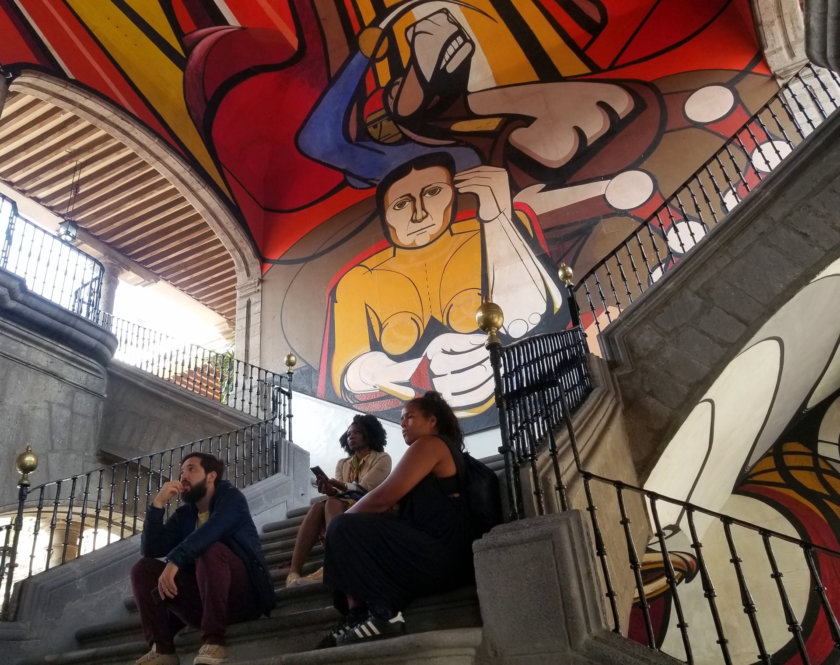
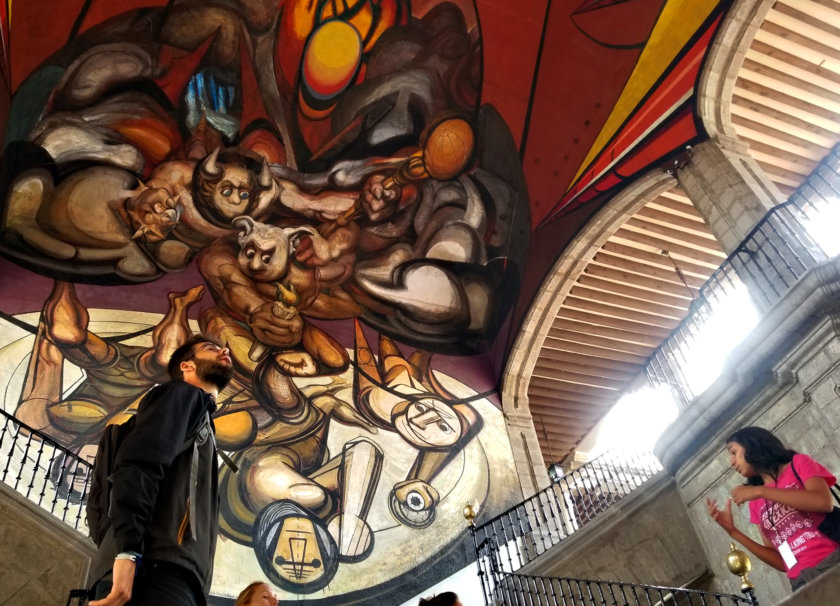
2nd stop: Antiguo Colegio San Ildefonso
We follow Diana’s pink T-shirt through the streets to the second building nearby: the Colegio San Ildefonso.
This was one of the colony’s most important educational institutions. It later became a school and then a university.
Several important intellectual figures studied in its facilities, among them Frida Kahlo. It was here that she first met Diego Rivera (nothing happened between them at that time, she was still very young), who was to paint a mural.
Diego Rivera’s 1st mural, “La Creación“, can be seen at the Simon Bolivar Theatre. It features many religious elements, which is far from the case in the rest of his works! Please note that photography is strictly forbidden, and the guard’s eyes are wide open.
In the same building, you’ll also discover frescoes by Siqueiros and Clemente Orozco, the third pillar of muralism and the guide’s great favorite. Each of the three artists had distinct relationships and stances regarding the revolutionary movement and the ruling authorities.
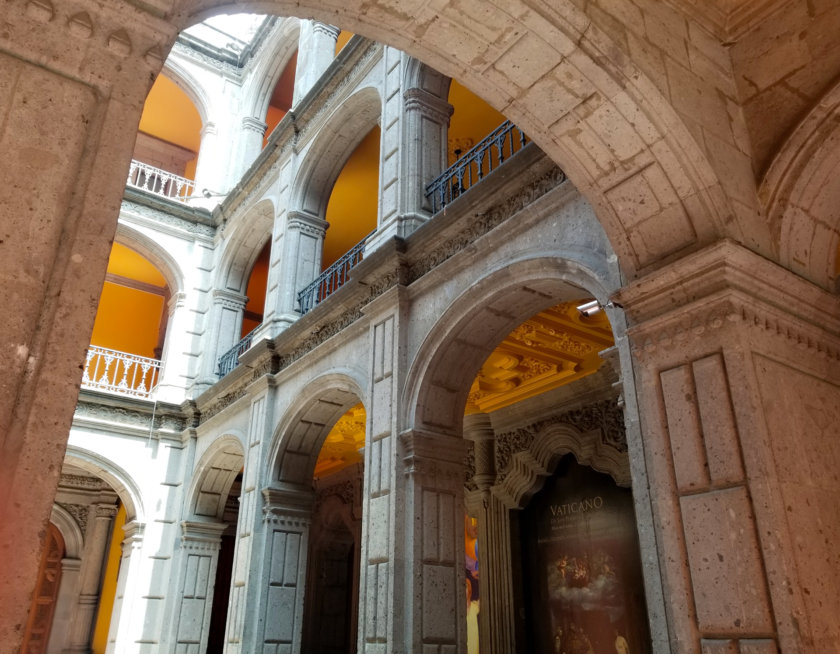
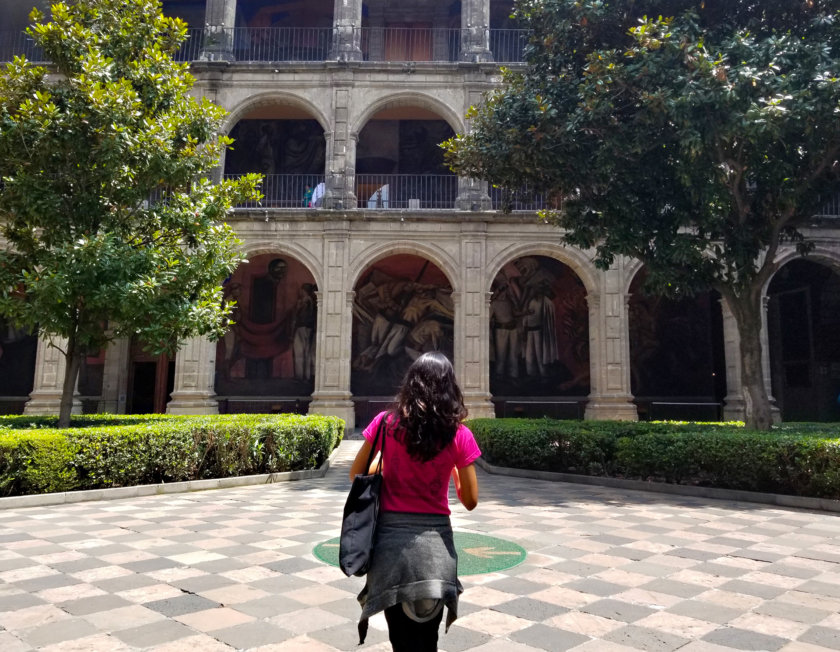
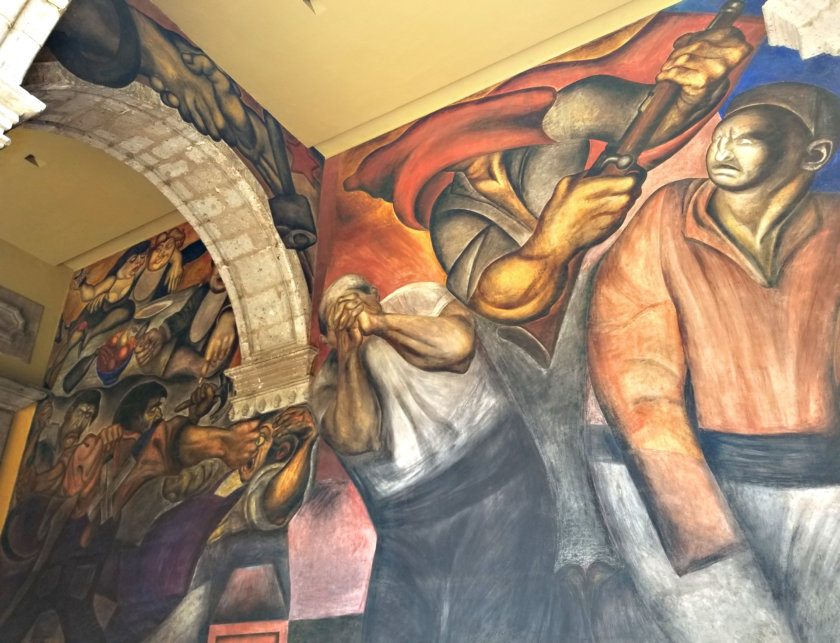
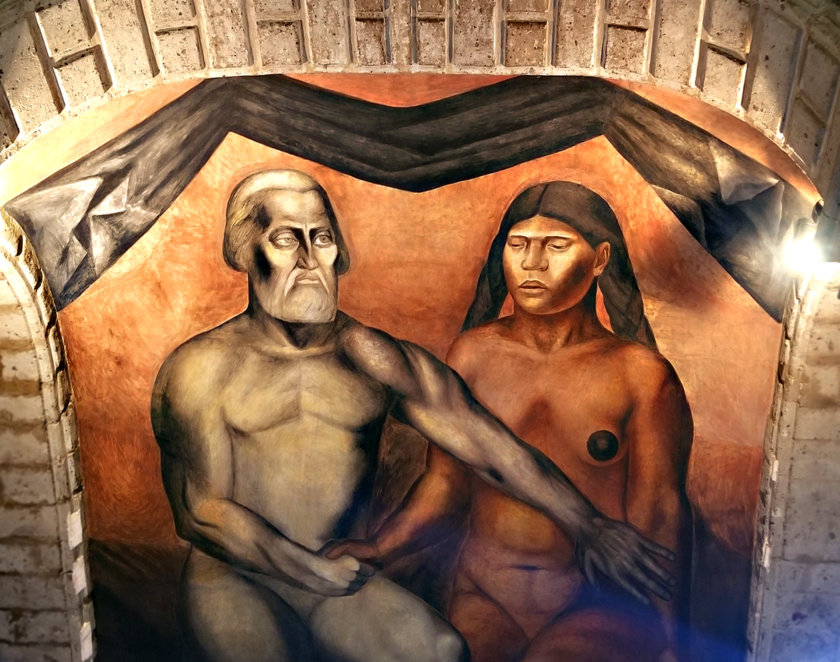
3rd Stop: Palacio Nacional
Last but not least on the tour: the Palacio Nacional, Mexico’s most important political building.
This has been the seat of power since the Aztec empire, when Moctezuma’ s palace was built on the same site!
This is also the site of Diego Rivera‘s greatest work, “History of Mexico “, created between 1929 and 1935.
This immense fresco presents the history of the country on three walls: pre-Hispanic life, the Spanish conquest, the Mexican Revolution, the American invasion and the French invasion. Diego has also taken care to present his own vision of the future for Mexico in the 20th century, with Karl Marx at the helm.
It features a host of illustrious figures and symbolic elements. It’s worth noting that here, every detail has a purpose, because Diego was a historian and knew his country’s history inside out. This makes the mural all the more fascinating!
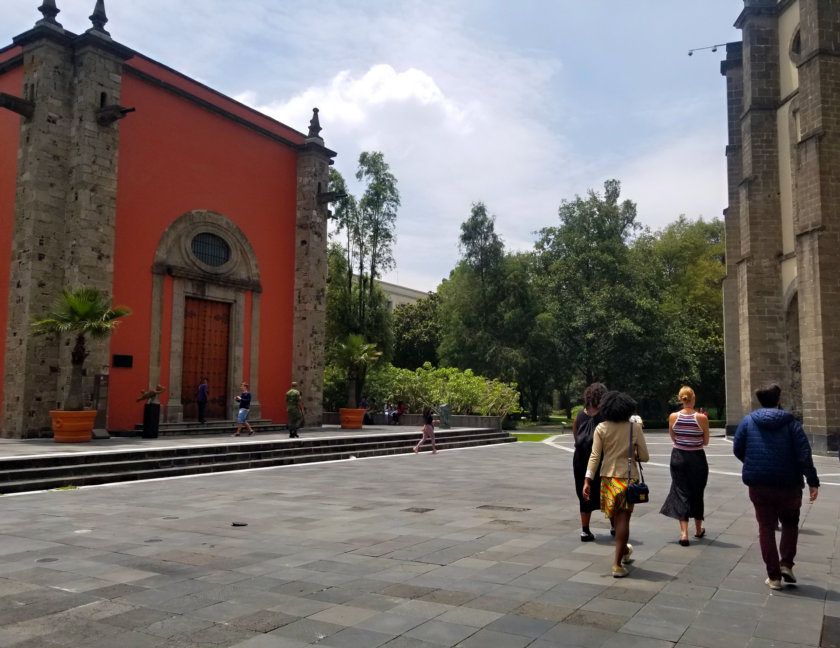
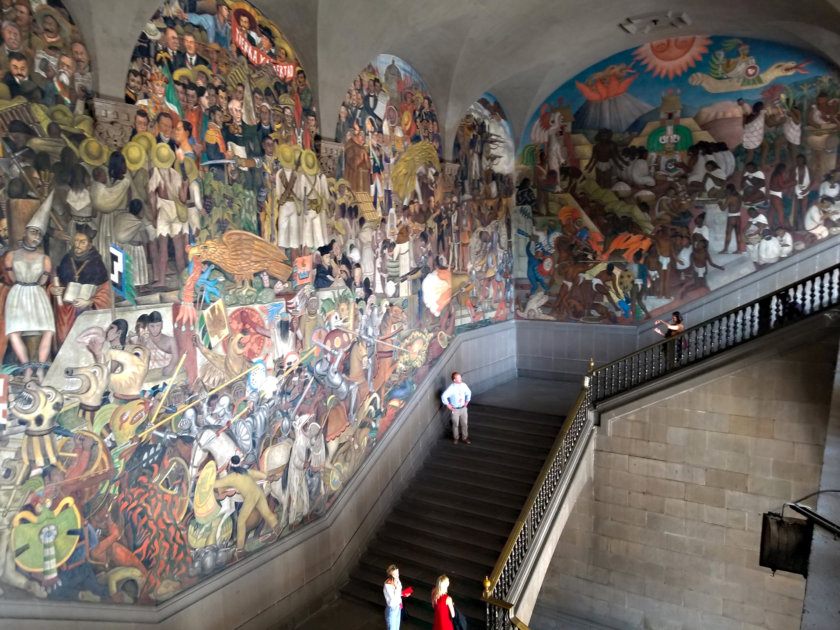
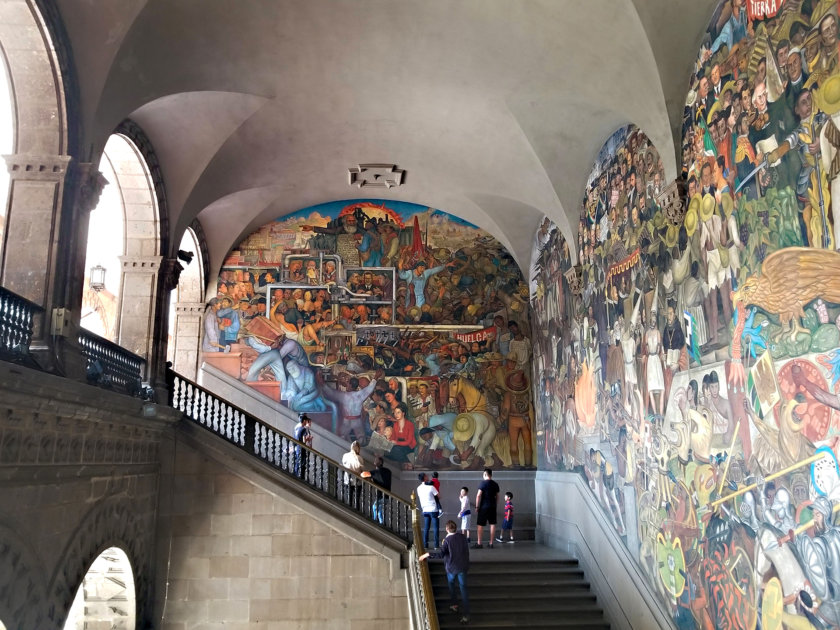
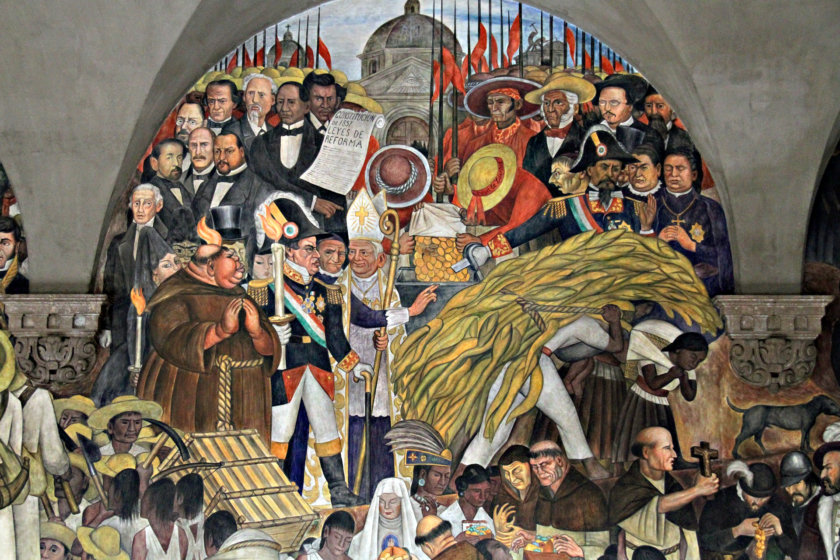
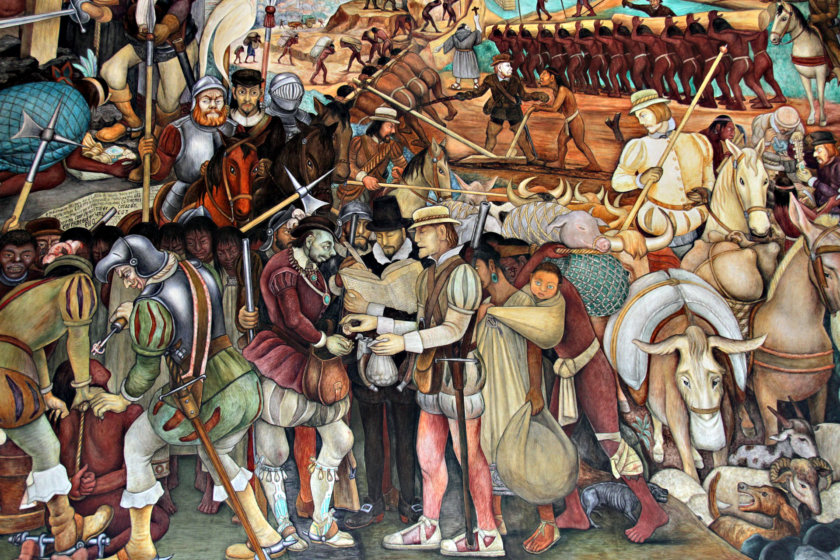
But of course, while this impressive mural is the star of the show, there are many other magnificent paintings to be seen, such as the one depicting the Tlatelolco Market, which is packed with detail: doctors, pre-Hispanic products, toys and more.
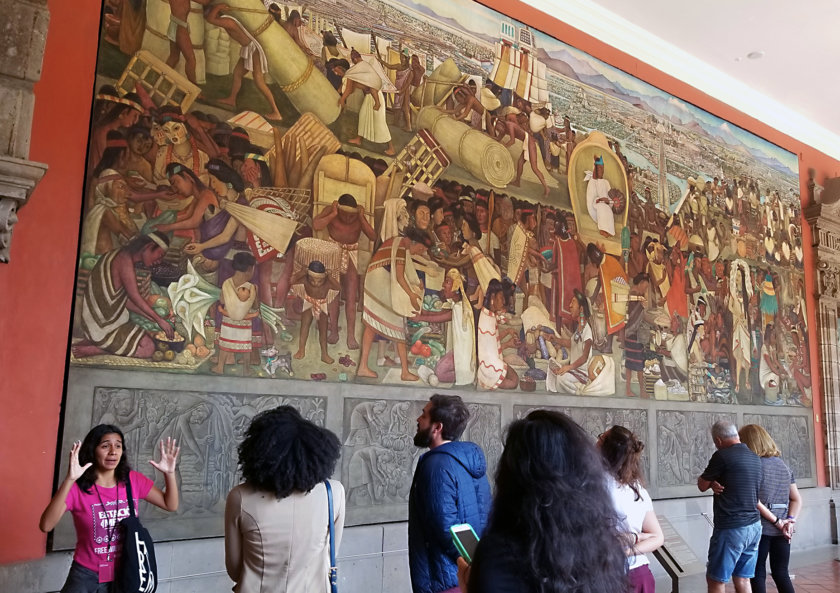
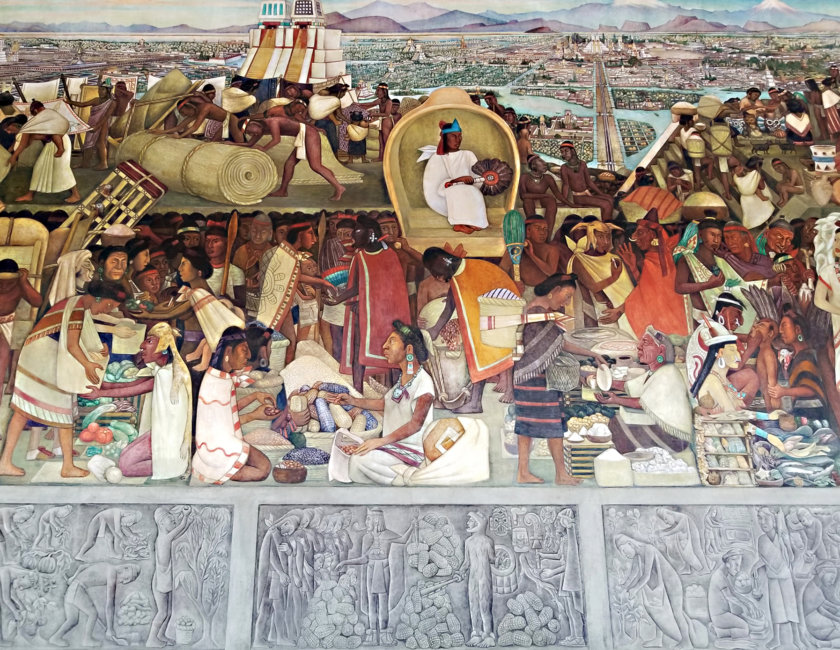
If you have an interest in muralism or want to learn more about renowned Mexican painters, I highly recommend taking the guided tour.
What I found particularly interesting was to understand the importance of these great names in the socio-political context of the time, and their different stances, far beyond their characteristics as artists.
Book the tour of Mexican muralism
You can book this guided tour in the historic center with Estacion Mexico here:
Where to stay in Mexico City
- Hostel Mundo Joven Catedral (historic center): one of the best hostels in Mexico City. Clean dorms and rooms, amazing rooftop terrace with bar, great atmosphere and an exceptional view over the cathedral and the Zocalo, starting at 15$usd for a dorm and 32 $usd for a private room!
- Hotel Villa Condesa (Condesa): if you are looking for a romantic hotel in Mexico City, this is a little oasis in the heart of La Condesa. It is an elegant house with small green terraces and tastefully decorated rooms. Rooms are spacious, breakfast is very good and the service is particularly attentive. Around 160$usd per night!
- Casa Goliana (Roma Norte): high-end hotel with the best value for money in its category, located in an early 20th century house, typical of the Roma area. Rooftop terrace, comfortable rooms, very attentive staff, and good breakfasts. Around 190$usd per night
- Four Seasons Hotel Mexico City (Juarez): this 5 star hotel is one of the best hotels in Mexico City, ideal for a business trip or a romantic stay. Located on Paseo de la Reforma between Colonia Juarez and Roma Norte. A large indoor garden, gym, swimming pool, spa, restaurant, and bar, Around 640$usd per night!
Rent a car in Mexico City
Renting a car is for sure the best way to explore Mexico and make the most of your stay!
While it’s not super useful to visit the city, having a car is a must to discover the rest of the country.
To rent a car, personally, I always use Booking.com Cars, for a few reasons:
- You can easily compare the rental cars prices between all the agencies: for sure the easiest way to find the best rate!
- Cancellation is often offered free of charge: no need to worry if you change your mind
- Booking Cars offers full insurance coverage at a lower price than the rental companies, so it’s an instant saving with no effort
Simply click on the green button to find your rental car at the best price:
How to find the best price for your flight ticket
Mexico City Airport officially named Benito-Juárez International Airport receives a lot of national and international flights. It is the most important airport in Latin America!
To save money on flight tickets, you can use our flight comparator for Mexico, in partnership with Skyscanner: it’s the guarantee to pay the best price for your international and domestic flights!
🚗 Rent a car
🗽 Book entrance tickets and guided visits
🏄 Book your sports activities
🌍 Take a travel insurance
🙎 Book a tour
✈️ Book your flight
You’re traveling in Mexico? These articles will help you!
Discover all my articles about Mexico: All my articles to help you plan your trip to Mexico are listed there.
- Mexico City: The 31 Best things to Discover
- 1 Day in Mexico City – How to spend just 24h in the Mexican capital
- 2 Days in Mexico City – The perfect itinerary for 48h!
- 3 Days in Mexico City – The Best Itinerary + Where to Stay
- 4 Days in Mexico City – Your Four-Day Must-See Guide
- Where to stay in Mexico City? – Best areas and hotels for all budgets!
- Mexico City on a Budget: Guide + All my Best Tips to Save Money
- The Definitive Guide to 40 Best Free Things to Do in Mexico City
- Teotihuacan (Mexico City): The Definitive Guide + Tips
- How to Visit Xochimilco (Mexico City): The Ultimate Guide
- Coyoacán (Mexico City): the Best Things to Do in Frida Kahlo’s Neighborhood
- Frida Kahlo Museum (Mexico City): Info, Tickets and Opening Hours
- Lucha Libre in Mexico City (Tickets, Venues, Tips & More!)
- Day of the Dead (Mexico): How to Celebrate Día de Muertos Like a Local
- 40+ Wifi Cafes in Mexico City that Every Digital Nomad Should Know About
- Itinerary: 8-10 days in Mexico – From Mexico City to Oaxaca
- Itinerary: 10 days in Mexico – Mexico City, Chiapas and Yucatan
- Itinerary: 2 weeks in Mexico – Best itinerary to discover the Yucatan Peninsula and Chiapas!
- Itinerary: 3 weeks in Mexico – Mexico City, Puebla, Oaxaca, Chiapas, Campeche, Yucatán and Riviera Maya
- Itinerary: 1 month in Mexico – My Epic 30-31 Days Itinerary from Mexico City to Cancun
- Road trip in Mexico: The best itineraries for 10, 15, 21 days and a month
- Itinerary: 1 week in Yucatan – The Ultimate 6, 7 or 8 days Itinerary
- Itinerary: 10 days in Yucatan – Best Itinerary for 9, 10 or 11 Days in Yucatan
- Itinerary: 2 weeks in Yucatan – Epic Itinerary + All my Best Tips!
- Itinerary: 3 weeks in Yucatan – Best things to do in 20-21 days
- Itinerary: 1 month in Yucatan – Yucatan Peninsula in 29, 30 or 31 days from Cancun
- Road trip in Yucatan: The best itineraries for 7, 10, 15, 21 days and 1 month
You’re using Pinterest? Here is the picture to pin!
